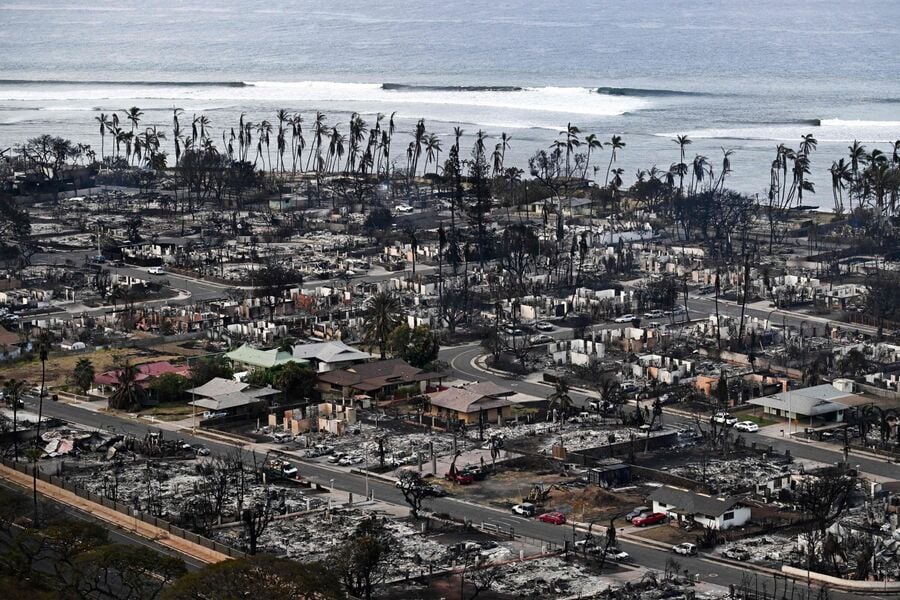

A growing number of asset managers are reassessing bond values tied to real assets, as a spike in the frequency of flash floods, fires and storms hits conventional pricing models.
Mitch Reznick, head of sustainable fixed income at Federated Hermes, says climate risk is a key reason why the investment manager is now underweight real estate credit. Jonathan Bailey, global head of ESG and impact investing at Neuberger Berman Group, says he’s increasingly looking at whether issuers have enough capital to deal with the fallout of climate change. And analysts at Barclays say nature-related risks are being mispriced across sovereign bond markets, and will ultimately trigger downgrades.
“There are often times where two otherwise very similar looking investment opportunities have very different physical risk profiles from a climate perspective,” Bailey said in an interview. A bond issuer that’s been able to protect itself from physical climate risk is likely to be the better investment over time, he said.
The credit ratings industry has yet to figure out how best to incorporate climate risk in its models, so fixed-income investors are largely having to rely on their own assessments to navigate the new landscape they face. According to the Institute for Energy Economics and Financial Analysis, bond investors can’t turn to credit ratings for a useful evaluation of environmental risks.
In a recent report, the IEEFA said that inside the biggest ratings firms, “alarm bells have been sounding for months.” But those internal warnings have gone largely unheeded, which is concerning, according to Hazel Ilango, an energy finance analyst focused on debt markets at IEEFA.
As large swaths of the planet get battered by extreme floods, droughts, storms and wildfires, failure to gradually reflect such risks in credit ratings is exposing issuers to bigger, sudden losses further down the road, the IEEFA said.
Barclays analyst Maggie O’Neal is among those to have spoken out about the potential for nature-related risks to trigger downgrades and dent portfolio values for bond investors who don’t react in time. Sovereign downgrades would in turn lead to higher borrowing costs, ultimately “compounding credit risk for bondholders,” she said in a September report.
Maria Drew, director of research for responsible investing at T. Rowe Price Group Inc., said there are big gaps in how cities and governments are preparing for the fallout from a more threatening natural environment. It’s become a “big area that the market probably just hasn’t fully factored in,” she said.
Cities and governments still need to do a lot more investing to address such risks, Drew said.
Such concerns are playing out against the backdrop of another shift in the asset management industry, as end investors increasingly move toward cheaper passive funds and away from actively managed products. Meanwhile, a recent analysis by Morningstar Inc. shows 36.6% of European active equity managers outperformed the average passive fund in the year through June, representing a steady rise since 2021. In bond markets, the figure is 62.7%.
Bailey says Neuberger Berman is now looking at an issuer’s exposure to risks associated with natural geography, including whether they have put in place the capital spending to adapt.
A single extreme weather event “is probably not going to make the difference,” Bailey said. But over time, it adds up. And if local authorities aren’t taking timely steps to protect assets from heat waves and floods, it will likely “have an impact on property valuations, on tax receipts from local real estate,” he said.
“On a sovereign level, it may have an impact on economic growth, which will impact the ability of sovereigns to raise taxes and be able to meet their debt obligations,” Bailey said.
Reznick says Federated Hermes incorporates physical risks into internal ESG (environmental, social, governance) scores that feed into investment decisions. The asset manager is underweight the real estate sector due to climate risks and governance concerns, he said.
Climate risk also has been factored into decisions including exits and choosing between different maturities of bonds for a lower risk profile, Reznick said. Another area of mispricing he’s watching is biodiversity and natural capital risks in sectors such as agriculture, cattle production, mining, paper and packaging, he said.
According to the IEEFA, regulators urgently need to step in and ensure that investors are getting the information they need to help them tackle the growing array of environmental risks. Without better rules, the industry is likely to remain “reactive, rather than proactive,” Ilango said.

Relationships are key to our business but advisors are often slow to engage in specific activities designed to foster them.

Whichever path you go down, act now while you're still in control.

Pro-bitcoin professionals, however, say the cryptocurrency has ushered in change.

“LPL has evolved significantly over the last decade and still wants to scale up,” says one industry executive.

Survey findings from the Nationwide Retirement Institute offers pearls of planning wisdom from 60- to 65-year-olds, as well as insights into concerns.
Streamline your outreach with Aidentified's AI-driven solutions
This season’s market volatility: Positioning for rate relief, income growth and the AI rebound
